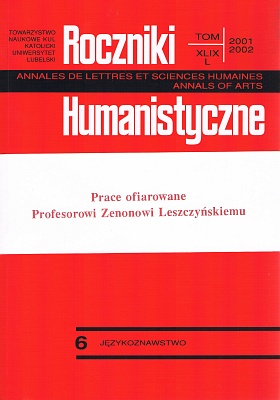Linguistic Taboo and Euphemism in the Religious Situation
Abstract
The paper deals with the question of the linguistic taboo in contemporary religious texts on the basis of some considerations on the stylistic and rhetorical means in the new parlance about God, the new language of contacts among the believers and between the believers and nonbelievers. The problem of the linguistic taboo has been shown on the basis of some generically different religious texts (homilies, catecheses, conferences, columns, testimonies, and announcements).
There is a reason to worry in the contemporary religious language, namely the tendency in contemporary Polish speaking people to make it colloquial. Polish users are unable to choose and select lexical means with regard to their communicative situation. In the religious situation particular components of the act of speech, such as the theme of a message, the context of expression - its place when words are said, the relations between the emitter and the recipient, therefore one should take special are about the form of communication. The religious situation (the place is often connected with the sphere of sacrum), it excludes a priori, as it were, the use of linguistic elements connected with taboo. One may assume that the users of the religious language should have special self-censorship in terms of vocabulary and style rooted in their consciousness.
The tendency to make the religious language more contemporary (on the level of homilies, or the translations of the Bible), this makes it that in various religious texts colloquial lexis is more and more common. The indication of modernity becomes, unfortunately, that which in common parlance is boorish and vulgar. The use of colloquial lexis in a non-standard situation, and such is public situation, may be connected with particular intentions of the emitter who consciously transcends linguistic and cultural conventions. The emitter of a religious text consciously breaks a customary norm by his use of dirty words. Trivial and vulgar words, like euphemisms, may be treated as a purposeful means of persuasion. The answer to the question, whether this means is effective is still open. There are metatextual operators which blunt some formulations, and this fact denotes that users are well aware that linguistic and stylistic conventions are broken. These operators contain a verb which deals with the act of speaking and an element of reservation, a kind of inverted comas.
Copyright (c) 2002 Roczniki Humanistyczne

This work is licensed under a Creative Commons Attribution-NonCommercial-NoDerivatives 4.0 International License.





